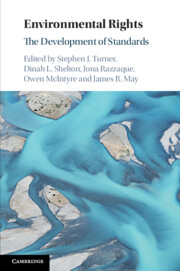Book contents
- Environmental Rights
- Environmental Rights
- Copyright page
- Contents
- Contributors
- Foreword
- Preface and Acknowledgements
- Abbreviations
- Table of Cases, Communications and Advisory Opinions
- Table of Treaties
- Table of International Declarations, Resolutions, Guidelines and Standard Setting Instruments
- Table of European Union Directives
- 1 Introduction: A Brief History of Environmental Rights and the Development of Standards
- 2 Environmental Rights and International Human Rights Covenants: What Standards Are Relevant?
- 3 The ECHR, Environment-Based Human Rights Claims and the Search for Standards
- 4 The American Convention on Human Rights and Environmental Rights Standards
- 5 The African Charter on Human and Peoples’ Rights and Environmental Rights Standards
- 6 The Aarhus Convention: Standards for Access to Justice in Environmental Matters
- 7 The Emergence of Standards regarding the Right of Access to Water and Sanitation
- 8 Standards in the Procedural Rights of Multilateral Environmental Agreements
- 9 A Stock-Taking of FPIC Standards in International Environmental Law
- 10 Environmental Standards and the Right to Life in India: Regulatory Frameworks and Judicial Enterprise
- 11 Environmental Standards in the Portuguese Constitution
- 12 The Argentine Constitution and Its Relationship with Environmental Standards
- 13 The South African Constitution – Standards of Environmental Protection
- 14 The French Charter of the Environment and Standards of Environmental Protection
- 15 The Constitution of Bhutan: A Quantitative Environmental Standard
- 16 The Rights of Nature: Guiding Our Responsibilities through Standards
- 17 Standards in Subnational Environmental Constitutionalism
- 18 Conclusion: Analysing the Development of Standards in the Field of Environmental Rights
- Index
6 - The Aarhus Convention: Standards for Access to Justice in Environmental Matters
Published online by Cambridge University Press: 09 May 2019
- Environmental Rights
- Environmental Rights
- Copyright page
- Contents
- Contributors
- Foreword
- Preface and Acknowledgements
- Abbreviations
- Table of Cases, Communications and Advisory Opinions
- Table of Treaties
- Table of International Declarations, Resolutions, Guidelines and Standard Setting Instruments
- Table of European Union Directives
- 1 Introduction: A Brief History of Environmental Rights and the Development of Standards
- 2 Environmental Rights and International Human Rights Covenants: What Standards Are Relevant?
- 3 The ECHR, Environment-Based Human Rights Claims and the Search for Standards
- 4 The American Convention on Human Rights and Environmental Rights Standards
- 5 The African Charter on Human and Peoples’ Rights and Environmental Rights Standards
- 6 The Aarhus Convention: Standards for Access to Justice in Environmental Matters
- 7 The Emergence of Standards regarding the Right of Access to Water and Sanitation
- 8 Standards in the Procedural Rights of Multilateral Environmental Agreements
- 9 A Stock-Taking of FPIC Standards in International Environmental Law
- 10 Environmental Standards and the Right to Life in India: Regulatory Frameworks and Judicial Enterprise
- 11 Environmental Standards in the Portuguese Constitution
- 12 The Argentine Constitution and Its Relationship with Environmental Standards
- 13 The South African Constitution – Standards of Environmental Protection
- 14 The French Charter of the Environment and Standards of Environmental Protection
- 15 The Constitution of Bhutan: A Quantitative Environmental Standard
- 16 The Rights of Nature: Guiding Our Responsibilities through Standards
- 17 Standards in Subnational Environmental Constitutionalism
- 18 Conclusion: Analysing the Development of Standards in the Field of Environmental Rights
- Index
Summary
- Type
- Chapter
- Information
- Environmental RightsThe Development of Standards, pp. 116 - 146Publisher: Cambridge University PressPrint publication year: 2019
- 3
- Cited by



